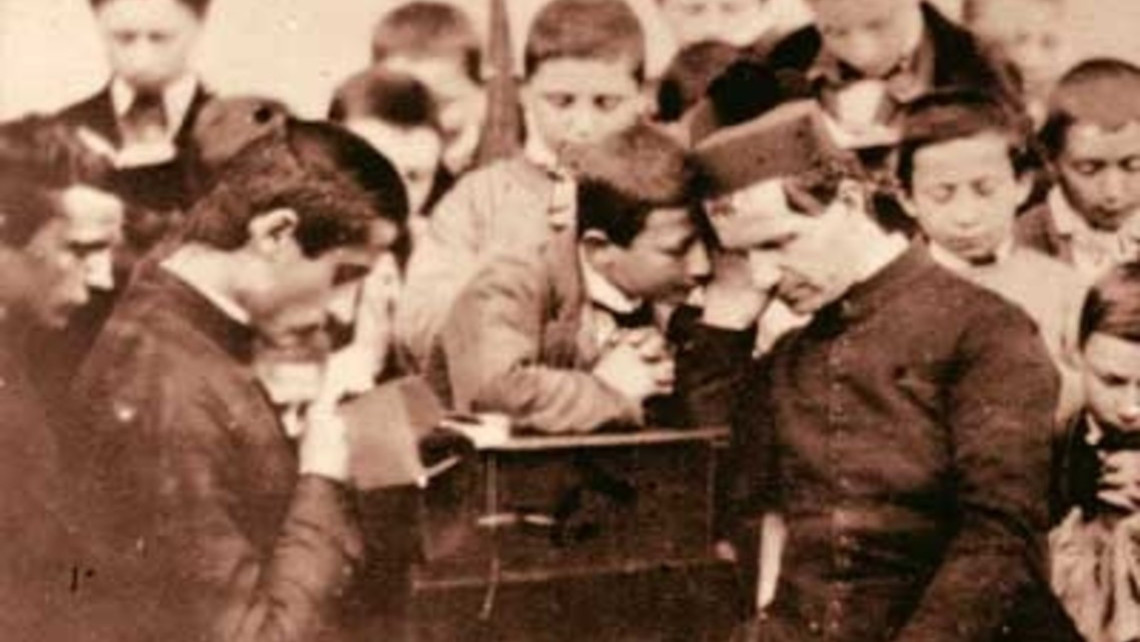
There are many significant graces one receives, I argue for choosing to serve as a teacher of religion, specifically a teacher of the Catholic faith. The role of the teacher or more appropriately catechist positions himself to be at the service of the Church in the transmission of the kerygma that consists of the proclamation of the Gospel and the instruction of the creed. Both facets of faith work together to unveil the beauty of Divine Revelation fully revealed in the Son Jesus Christ the Word made flesh.
In the Gospel of St. John, Jesus reminds us that the teaching of the faith comes from God and not from our human condition.[1] Every time a person decides to speak well of God, the words and gestures of instruction reflect Him and not ourselves. St. John Paul in his Apostolic Exhortation Catechesis Tradendae reminds us that the practices of catechesis in the early church represented the totality of the Church’s efforts to make disciples, to help men believe that Jesus is the Son of God so that believing they might have life in His name, and to educate and instruct them in this life, thus building up the body of Christ.[2]
If a principal aim of religious instruction is the formation of the person to be a disciple of Jesus Christ it would be safe to assume that the general population would at least be amenable to this process. However, in the life of St. John Bosco, this was far from reality as he dealt with an Italian political climate that had become hostile to the Catholic faith to the point that Don Bosco’s life was under constant threat. Between 1865 and 1873 the life of the Church in Rome encountered a great deal of animosity, hatred, and visible disdain by a government that sought to suppress the Divine institution of Christ. Through suppression of Church lands by not allowing newly ordained Bishops to take charge of their new Diocesan sees, the Church of Jesus Christ was amid great religious oppression.
Against this backdrop, the great St. John Bosco, patron of youth found himself involved in the religious politics of the day[3] primarily to defend the role and the authority of the Pope while at the same time addressing the rise of anti-clericalism that was stifling the ability of Priests to minister the faithful.
St. John Bosco himself has been blacklisted as a person of interest[4] to the point that several attempts were made on his life with the first occurring in 1848 while surrounded by a group of boys conducting a service in church. A shot fired through the window narrowly missed him, grazing his soutane and making a hole in the wall just behind him. The volume of threats on his life and ministerial work ranged from warnings not to continue publishing Catholic books or else he would be assaulted to an attempt to poison him[5] due to his influence in promoting and defending the Catholic faith and his work with the boys of Turin.
It was indeed a very precarious time for the oratory of San Giovanni Bosco but Don Bosco’s faith never wavered especially toward the protection of the children of the Salesian oratory. He knew that the need for religious formation especially for the youth of his oratory was more important than ever, even if it meant the cost of his life. The practice of secular humanism had grown rampant and was championed as the new religion of man, one that defined man as a self-proclaimed deity rejecting the goodness of human nature, religion, and joy.
Don Bosco’s preventive system of religious instruction which consisted of teaching reason, religion, and kindness was developed against a humanist approach that saw any form of religion as an affront to personal human prosperity. Don Bosco was determined to allow the boys of his oratory to fall prey to this mindset, he saw every child as a gift, a jewel that needs to be carefully protected, nurtured, and nourished in the faith.
It was with this backdrop that Don Bosco developed his famous preventive educational system which focused on winning the child’s heart. Nothing will matter unless the child knows he is loved, protected, and cared for. The remedy for addressing unbelief in a child is to express a direct outward act of love. His preventive system addressed what he described as two means that the spirit of evil employs in endeavoring to dissuade children from walking along the path of virtue. Firstly, by insinuating into the child’s mind the idea that a good life means leading a dull, melancholy existence in which all forms of pleasure are forbidden; secondly, by suggesting to the child that his life will certainly be a long one and that there will be time enough in old age or at the point of death for repentance.[6]
If the remedy for addressing unbelief is the teaching of religion out of love, then St. John Bosco provides us with the hope that the virtue of love when properly discerned and lived, can resuscitate the heart and mind of the child toward Jesus Christ. St. John Bosco describes the practicality of his approach in the following way;
I have simply evolved my method of going to work by endeavoring to hearken to the inspiration of God and adapt myself to each fresh circumstance as it arose.[7]
“Do you want our Lord to give you many graces? Visit Him often. Do you want Him to give you few graces? Visit Him seldom. Visits to the Blessed Sacrament are powerful and indispensable means of overcoming the attacks of the devil. Make frequent visits to Jesus in the Blessed Sacrament and the devil will be powerless against you.”
St. John Bosco






